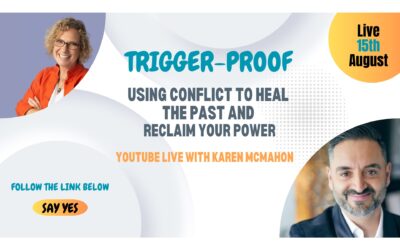IT’S NEVER ABOUT WHAT IT’S ABOUT.
a projection, like a movie playing on a screen.
But the drama isn’t on the screen.
It’s inside the projector—YOU.
You know the cycle, don’t you.
- The same arguments on repeat, like a bad playlist you can’t escape.
- The rising tension that makes you feel unseen, unheard, and powerless.
- The emotional meltdowns that leave you drained,
questioning if love is supposed to feel this heavy.
dressed in different clothes.
It’s exhausting.
You’ve wondered:
- “Why do they keep doing this?”
- “Why can’t I just find someone who gets me?”
- “Is it me? Am I the problem?”
Yes, it’s you (like the Taylor Swift song).
This is the essence of “Projections" in relationships.
Every time you’re triggered, two hidden dynamics are at play:
Projection 1: “Just Like When”
(you know who I’m talking about).
Maybe it’s your partner’s dismissiveness that echoes your mother’s silent treatment.
Or their criticism that feels eerily like your father’s impossible standards.
You’re not fighting your partner.
Projection 2: “Just Like Me”
- Their neediness makes you furious
because you’ve buried your own parts that are anxious and needy. - Their jealousy drives you mad because it reflects your own insecurities.
This is why conflict feels so raw—
It’s about the unresolved parts of you.
This is why having the courage to look at your own shadows
is so magical.
Imagine this:
- Instead of avoiding conflict, you lean into it as a tool for growth.
- Arguments stop feeling like emotional landmines
and start becoming opportunities for intimacy. - You no longer chase love, approval, or security. You become it.
When you learn how to “integrate" these two projections,
everything changes:
- You stop blaming your partner for your triggers.
- You reclaim your power and become the secure partner you’ve been searching for.
- You create a relationship where love feels like peace, not chaos.
Try This: Shadow Work in Action
Here’s a simple exercise to take your first step:
- Pause. Take a deep breath the next time you’re triggered.
- Reflect. Ask yourself:
“Who does this remind me of?”“What’s the first memory this situation brings up?”
-
You will notice that this frustration is a reflection,
just like when you were younger in a similar dynamic.
You’re replaying it as a chance to heal. - Then pick up the mirror. Now ask:
“What trait in them might actually be a reflection of me?”“Where do I do the same in my own flavor?”"What part of myself am I rejecting right now?”
- Write your answers down when you’re reflecting.
This is where things begin to shift.
no longer held hostage by your triggers.
No more arguments spiraling into chaos.
No more chasing approval or fearing abandonment.
Instead, you approach conflict with clarity and grace.
You stand grounded in your truth—without anger, without fear.
You create relationships that feel like a safe haven, not a battlefield.
When you put down the magnifying glass and pick up the mirror,
something extraordinary happens:
and you become the catalyst for transformation.
This is the power of becoming Trigger-Proof.
It’s not about being perfect.
It’s about showing up authentically,
owning your story, and learning to repair when things go off track.
and you hold the key to both.
This pattern didn’t start with you,
but with the right tools, the power is in your hands for it to end with you.
Your guide in breaking the cycle,
P.S. If this message resonates,
and you’re ready to stop losing yourself in relationships…
I’m offering a free Blind Spot Intuitive Session ($497 value)
to those who are serious about breaking free from this cycle
and creating secure, thriving relationships.
On this session, we’ll identify the exact unconscious patterns keeping you stuck
in enmeshment and map out how to reclaim your independence
without losing your connection.
But here’s the catch: This is only for those who can follow instructions,
and aren’t going to be too offended by some critical feedback.
If you’re ready to see your blind spots
and make the changes that will shift your love life,
comment or DM with
- your back story and what your situation has been like
- how this has been impacting your work
- what therapies and modalities you’ve tried to resolve it
And finish the response with “Nima can I get a link to your private calendar?”
and if I think I can help you from the back story you provided,
I’ll send you a link to my calendar.
Let’s break the cycle, together.




